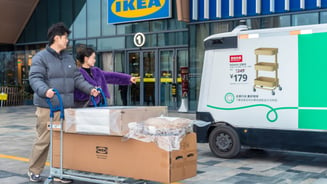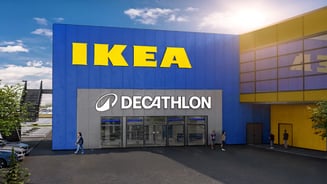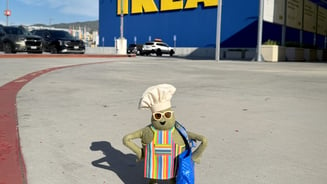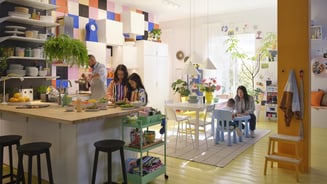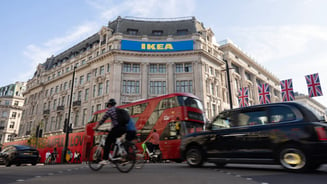It is a common story at IKEA. You start your career on the sales floor, putting goods on the shelves or storing trolleys. Then you embrace new opportunities, learn and grow together with the company. Finally, you find yourself in a position to shape the retail development of IKEA from the U.S. to Australia while being a voice for a positive societal change.
The story of Sara Del Fabbro, our Deputy Ingka Retail Manager (Deputy COO), is one of those.
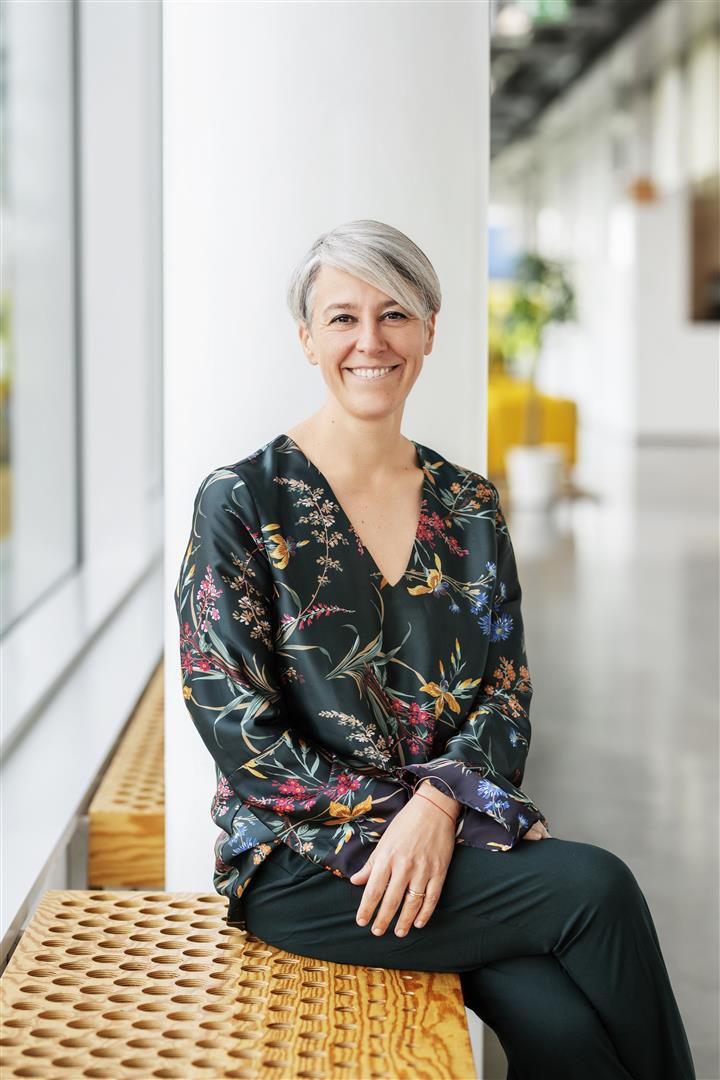
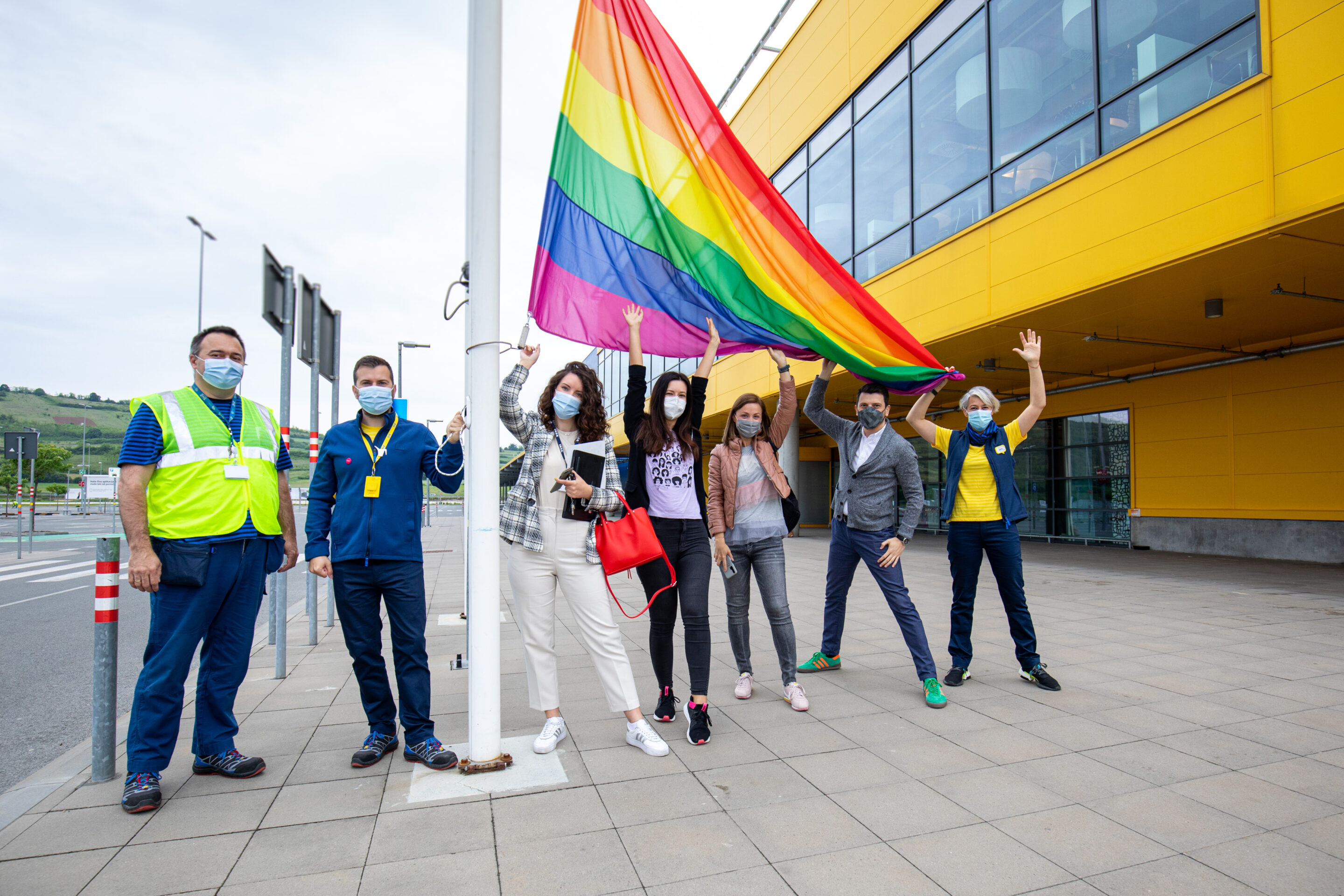 Sara Del Fabbro to the far right, Pride Belgrade, May 2021.
Sara Del Fabbro to the far right, Pride Belgrade, May 2021.
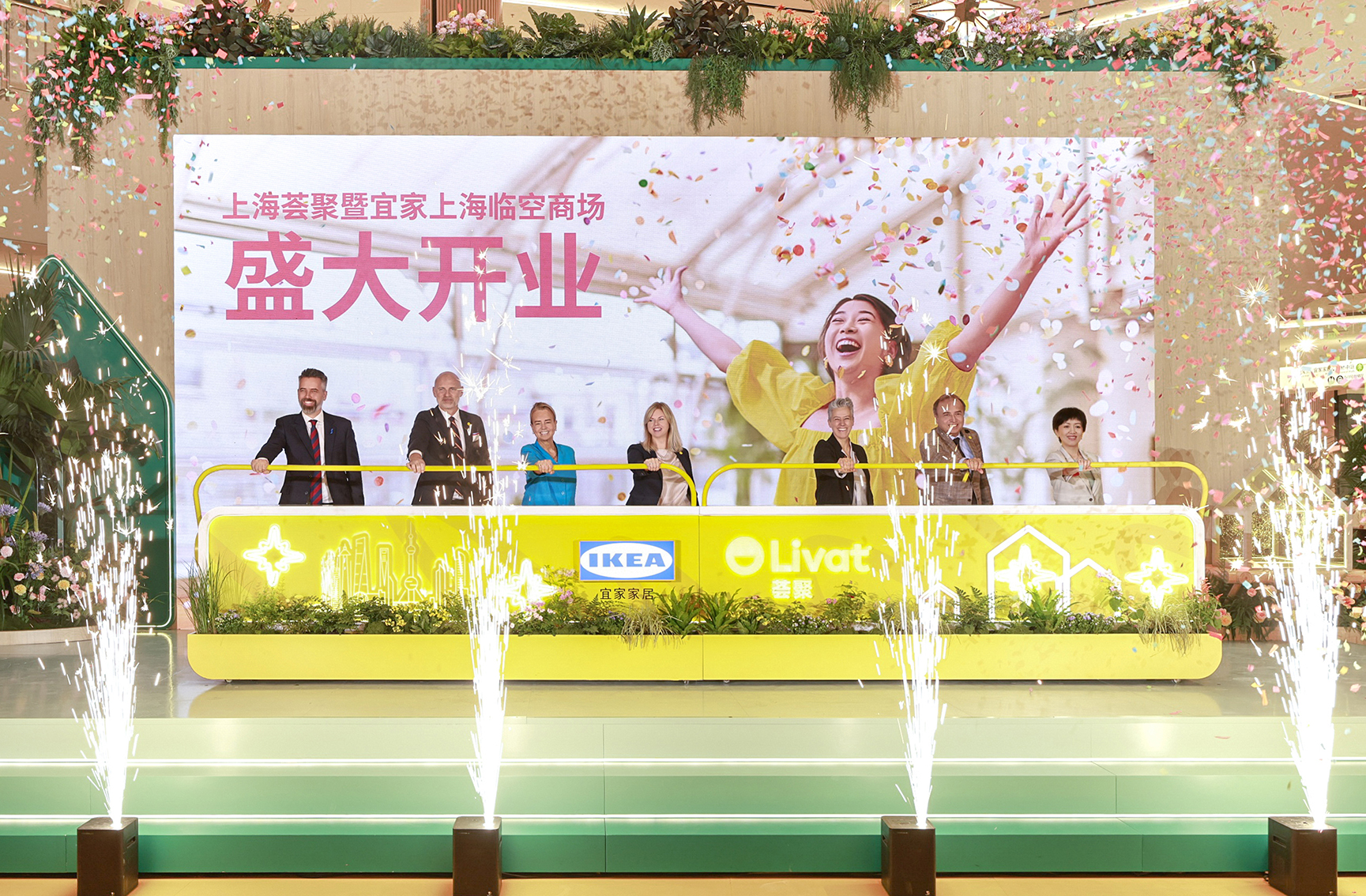 (Header photo) Opening of the Liva meeting place in Shanghai, for more details click here.
(Header photo) Opening of the Liva meeting place in Shanghai, for more details click here.
Full transcript available below:
Thanks for joining us today. I’m Paul, and I’m here with Sara Del Fabro from Ingka Group, who’s going to talk to us about what’s driving the Ingka Group retail business at the moment.
Sara, this is an important year for you. It’s your 25th anniversary at IKEA – your Silver Jubilee. What stands out for you personally and professionally over those 25 years of working at IKEA?
Thanks for having me, Paul. Yes, this is a special year – 25 years with IKEA. It’s also my 50th birthday this year. So it’s half of my life I’ve spent with IKEA. I was just thinking about what that means as a person, but also as a professional. And as you said, first of all, it’s a relationship. That’s the first thing I would say. It’s like being engaged in a long-lasting relationship with a brand, with a company.
The key word for me is values. There is a strong connection between who I am and what my inner values are and those that define this company and this brand. The second is colleagues. It’s a place where you have the opportunity to meet amazing, incredible people, both in your team and across the organization. And then the third is passion for life at home. Each of us has a life at home, so it’s a business that by definition is very close to the everyday lives of human beings. I really love having the opportunity to be paid to do a job that has an impact and influence on that.
So, 25 years of fun and challenges – but no regrets. I would do it all again.
What gives you energy on a daily basis? Where does that continual drive come from?
Retail is an industry and a business that, if you really love it, is different every day because it connects with what’s going on in the market and what trends are influencing how people spend their money and what they prioritise. Life at home is a topic that sometimes you may not think much about – it’s just part of your normal decisions. You make choices on how to furnish or refurnish your home, especially when life changes and you have new needs you didn’t have before.
It’s a very dynamic environment. I think the pandemic was a moment where many of us, forced by our circumstances, began to reflect on how to make our homes better. If I have to spend all 24 hours in a space, how do I make it a place? How do I make it a home? That gives me a lot of energy because I have a big passion for it.
I don’t know if it’s my Italian roots – being influenced by design and iconic brands well known across the world – or simply my own love for creating a better everyday life. When you look at things through the lens of home furnishing solutions, you see something new you can do every day.
That’s number one. Number two, which is deeply connected to who I am, is the personal legacy I want to leave. I wouldn’t call it ambition, but rather a commitment – to create a more inclusive world and society. In my small circle of influence, I always strive to fight for equality and stand up for a more inclusive society. That’s incredibly important at IKEA too, because we are for the many. You need to understand the many. That creates a strong bond for me. In every role I’ve had, I’ve always found a way to think not only about the business, but also to bring the people dimension into it.
You mentioned the pandemic, and that’s an interesting point. Since 2019–2020, the world has seen a lot of disturbances: the pandemic, geopolitical tensions, cost of living increases, inflation. Has this period also created opportunities for IKEA?
Definitely. I think that crises or challenging times like the ones we’re living through always bring opportunities. When you look at what we call our three forever directions – being affordable, being accessible, and having a positive impact on people and the planet – these aren’t new for us.
If you consider that these are the areas we are committed to, then moments when people are struggling – losing jobs, living in uncertainty due to the macroeconomic situation – become opportunities for us to be even more present. You may not understand the entire situation, but you experience what it means for you and your family. That brings us the opportunity to show up with our solutions, our furniture, and our brand. We provide families with alternatives and meet their needs.
This is a fantastic opportunity. It requires consistency. You have to navigate through it without being tempted to change direction. That’s why it’s so important for us to stick to our vision and keep developing it.
Let’s go deeper on trends. What trends have you seen in recent years? For example, did certain furniture items become more popular during the pandemic?
Working at Ingka, the largest franchisee within IKEA, gives us the opportunity to see many markets – from America to Asia. My first reflection is that we’re all human beings, and that means there are many similarities across markets. These help us identify global trends like using the same space for multiple functions or how people move and shop. These are big trends we see everywhere.
On the other hand, there are small but important differences. This is where each market’s power lies – in really understanding their consumers and what’s relevant to them. For example, in Asia, convenience is key. Everything is done from your mobile phone, whether it’s buying a bus ticket or furniture. It’s integrated, simple, and user-friendly. Services play a huge part in that.
In more traditional markets like Europe, we’re slowly adopting a more digital life. I use my mobile for many things beyond calls, but people here still live differently. Social commerce is a great example. I was really impressed to see how brands in Asia – and IKEA too – are using media and channels not just to communicate or showcase products but to actually sell them. Coworkers went from being salespeople in a store to being salespeople in front of a camera on social media. That’s very common in China and other parts of Asia, though not yet in Sweden – but it’s coming.
That’s very interesting to me, because behaviors evolve. They may start somewhere, but globalization means we’re all curious and inspired by what’s happening elsewhere. This gradually changes societies.
Your role takes you to Asia a lot. Can those markets – like China, South Korea, or Japan – teach us in Europe and other markets? Are we learning from them?
Definitely, yes. These markets give us an immense opportunity to look into the future of trends. Then we can test and try them. When we know something is successful and relevant for the many, we scale it up.
There’s a lot going on in terms of fulfillment and automation, and also in the retail space itself – the way physical stores are evolving. These are all areas where we will continue to learn. I’m curious to see what stays with us and what ends up just being a passing trend.
That’s why we need to be more flexible and agile in how we learn – more than we ever have in the past.
You were CEO in Southeast Europe, which includes several countries. During that time, IKEA was one of the first brands to raise the Pride flag. What did that mean to you personally?
Thank you. That’s a fantastic question. I’d say it was one of the most important moments in my life – when personal and professional life merged. I’m married to a woman. I don’t represent the traditional family that’s recognized in some of these markets, though I respect all kinds of families.
But I felt a sense of urgency and responsibility to stand up for what it means for IKEA to be for all families. Being one of the first companies to raise the flag – I’d do it again. I can’t imagine doing it without the amazing team that supported me.
They gave me the courage to be the face of that message. In many parts of Europe, raising a flag or using a rainbow stripe feels natural. You might forget the importance of doing it, because it’s accepted. But that’s not the case everywhere. And that reminded me that we need to stand up for what we believe, wherever we are.
That was a huge personal learning. I still go to Pride. I don’t say, “I’ve done enough.” No – I go, and I invite others to join me. That’s because not everyone feels safe or seen, and I’ve received so many messages of gratitude from people in Southeast Europe saying it meant something to them.
Some criticism came too – people questioning why we were doing it. But when dialogue happens respectfully, that’s not a problem. Today, years later, I see that the Pride flag is raised every year in that region. More organizations are joining, which shows how powerful that evolution has been.
We’ve touched on your 25 years, the world’s challenges, and your leadership in inclusion. Would you say that IKEA’s values are one of the main reasons you’ve stayed with the company?
Definitely, yes. It’s a fantastic company. The business is super interesting, and I have a passion for home furnishing. Sure, there are other brands where I could do similar work. But I felt hooked by the values and the culture.
Not just because of the connection with people, but also because I see the business value in it. Diversity and inclusion are like a lens – if you want to serve the many, you need to understand the many. Needs differ, and home furnishing needs are different too.
One thing I’m very proud of is that, from fiscal year 2016 to today, we’ve grown the business by nearly 24% in sales and turnover, while reducing our CO₂ footprint by more than 30%. That proves that being a good business is good business. D&I is part of that. Climate is part of that. The umbrella of sustainability is powerful.
That’s why, after nearly 26 years, I’m still a proud coworker.
Let’s end by looking ahead. Where do you see the retail business in 10 years? And how does sustainability factor into that vision?
Retail is a business for humans. It puts people at the center – their needs, their dreams – and it’s delivered by other people. So it’s a very humanistic business. I think the future is brilliant and bright.
We must stay close to reality and really understand how behaviors are changing. That means being close to customers and coworkers.
One area where we need to go bolder is omnipresence – transforming from a brick-and-mortar model to being close to people wherever they are. Another is continuing to develop a range that helps people live differently. Multifunctionality, living in small spaces, adapting to urbanization – these are long-term strategies we’ll continue to build on.
We also need to help coworkers understand how their jobs are changing. We’re automating more than before, using more tools that serve customers both in-store and online. This requires investment in training and learning – AI is part of that. AI is a companion, not a substitute. It enables our people to focus on what machines can’t do – the human connection.
These are the major movements we need to focus on going forward.
And you must be excited – New Zealand is opening soon?
Yes, you’re right! That’s huge for the company. Opening in a completely new country is always an amazing moment, and people there are waiting for IKEA. I’m sure it will be a massive success.
We’re also opening more locations within existing countries and experimenting with new, smaller formats. That’s really exciting, and we’re learning a lot. Some assumptions are being confirmed, while others reveal surprising customer behavior.
We just opened a fantastic store on Oxford Street in central London. That store is about understanding how to position our brand.
In Budapest, one of our existing stores has been transformed to combine customer service with optimized fulfillment like never before.
We’re eager and curious to see what works. These are just a couple of examples of how dynamic our market expansion is today.
We’ll be speaking to Matt Gould, the Oxford Street store manager, in another episode. So that’s a great way to end. Thank you so much, Sara, for taking the time today.
Thank you, Paul. It’s been a pleasure.
Media enquiries
For further information, journalists and media professionals can contact us at [email protected] or by calling +46 70 993 6376.




